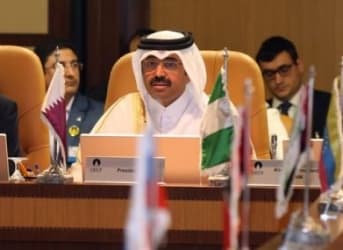The way things are shaping up on the oil price panic barometer, 17 April is now a D-Day of sorts for the industry. It’s the day both OPEC and non-OPEC countries will sit down together in Doha, Qatar, to work towards an output freeze deal.
OPEC President Qatar will host the meeting as a follow-up to a late February meeting that was attended by Qatar, Saudi Arabia, Russia and Venezuela—when the initial idea of an output freeze to January levels was bandied about, and that the idea is being “increasingly supported” by Saudi Arabia and Russia.
“It is worth noting that the earlier Doha meeting of February 16 has changed the sentiment of the oil market and put a floor under the oil price. This has triggered a broad and intensive dialogue between all oil producers out of the conviction that current oil prices are not sustainable,” according to a Qatari Energy Ministry statement. Related: Oil Industry On Edge As Political Turmoil In Brazil Rages On
But now that prices have somewhat rebounded to the $40 level—up 30 percent or so since last month when the output freeze was first brought up—what is everyone expecting from Doha?
While the meeting scored a bit of a coup by winning a Saudi commitment to attend, there has been some undermining of things by Russian Energy Minister Alexandar Novak, who said yesterday that the meeting would only “probably” be held in April.
The official line is that the supporters of the freeze are looking for commitments from more producers, both within OPEC and outside of OPEC. But those who have committed so far are doing so contingent on others committing as well. Related: ‘’Iran’s Return To The Oil Markets Less Damaging Than Expected’’
Venezuela—the hardest hit—is fully committed. Qatar has been lobbying for the freeze from the onset. Kuwait is committed. But Iraq, which represents the strongest supply growth among OPEC countries—is not keen on the idea, and Iran, fresh off sanctions, has said it would commit only after it reached a production level of 4 million barrels per day. That’s not going to be April.
The biggest coup for the Doha meeting is that Saudi Arabia has said it will attend.
Despite everything that could go wrong at Doha, oil prices are maintaining the new “high” on hopes of an output freeze, even if only at January levels.
"There is continuing jaw-boning about production cuts from OPEC members, and inventories are now coming in at the lower end, rather than the higher end of expectations,” CMC Markets chief analyst Michael Hewson told Reuters. Related: The Rationale Behind Russia’s Withdrawal From Syria
But plenty still view a potential output freeze as a red-herring.
"Any such deal would still not be a game changer. It would really just maintain the excess supply that is now in place," Thomas Pugh of Capital Economics said in a note, as carried by zeenews.
In an interview with Bloomberg, Saxo Bank commodity strategy head Ole Sloth Hansen put it succinctly: “Having seen the positive impact of verbal intervention since the low point was reached in January, it is now up to OPEC and non-OPEC members not to destroy the recovery, which as this stage, remains fragile, given current fundamentals.”
ADVERTISEMENT
But now that prices have rebounded a bit, Doha has perhaps become less important. What that means is that it’s more about what they say than what they actually do in Doha.
By Charles Kennedy of Oilprice.com
More Top Reads From Oilprice.com:
- Despite Fundamentals, Oil Surges Above $40
- Oil Prices Rally To 2016 Highs On Weaker Dollar
- Dear President Trump or President Clinton, Here is Your Energy Agenda


















